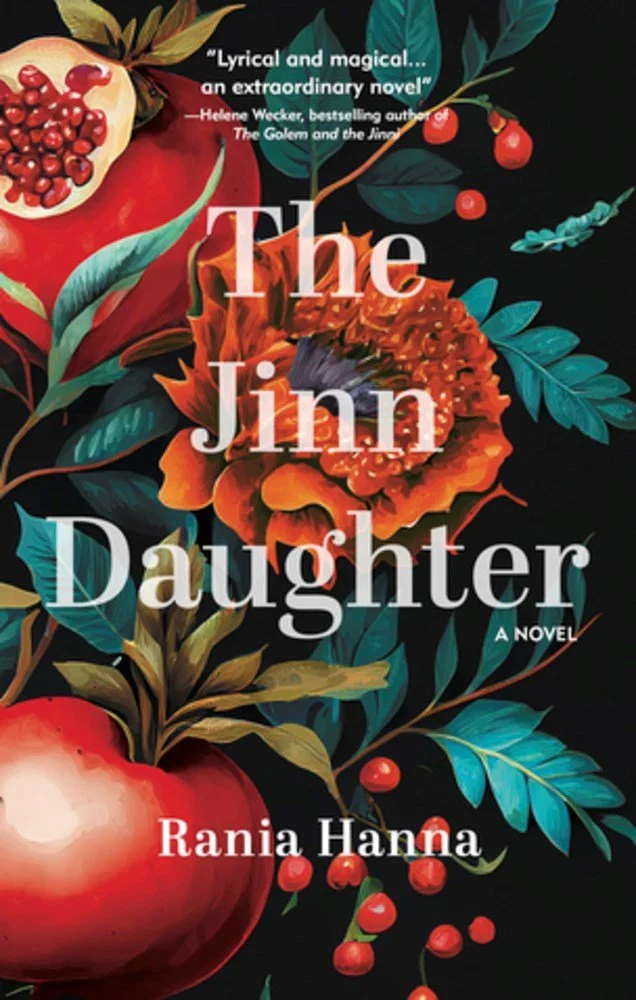Spotlight: The Jinn Daughter by Rania Hanna
/A stunning debut novel and an impressive feat of storytelling that pulls together mythology, magic, and ancient legend in the gripping story of a mother’s struggle to save her only daughter
Nadine is a jinn tasked with one job: telling the stories of the dead. She rises every morning to gather pomegranate seeds—the souls of the dead—that have fallen during the night. With her daughter Layala at her side, she eats the seeds and tells their stories. Only then can the departed pass through the final gate of death.
But when the seeds stop falling, Nadine knows something is terribly wrong. All her worst fears are confirmed when she is visited by Kamuna, Death herself and ruler of the underworld, who reveals her desire for someone to replace her: it is Layala she wants.
Nadine will do whatever it takes to keep her daughter safe, but Kamuna has little patience and a ruthless drive to get what she has come for. Layala’s fate, meanwhile, hangs in the balance.
Rooted in Middle Eastern mythology, Rania Hanna deftly weaves subtle, yet breathtaking, magic through this vivid and compelling story that has at its heart the universal human desire to, somehow, outmaneuver death.
Excerpt
The dead have been dropping all night.
I wake before the sun is bright enough to cut across the horizon and I gather the pomegranate seeds scattered in front of my home—bright fruit that collects like a crimson puddle under the twisted tree. There are many seeds this morning, and the weight of the basket tilts me as I hobble back inside my cottage.
My daughter, Layala, is still sleeping in her cot as I sit down, joints clicking. I am only thirty, yet the years weigh heavier on me than they should, and I sigh as I pluck seeds out of the basket. They’re red and plump, these seeds, and leave my hands sticky. I press them between two pieces of wood and let the juice seep into a bowl. Each seed is a soul’s story, and every story must be told. As Hakawati Jinn, is it my duty to tell the stories of the dead and send the souls to final—and hopefully, peaceful—death.
When the seeds have been pressed into a ruby juice, I take a sip and wrinkle my nose. “Bitter today,” I mutter to myself, pouring honey into the cup. I stir, then take another drink.
The stories come in flashes, too quick for my mind to understand, and I’m too tired to try, but my magic is fast enough to catch them.
Snatches of a river flowing fast; the brown of a head topped with seaweed, floating on.
I catch the green of a tree and a swing hanging from a thick branch. I think I hear the growl of a bear. Or the clash of blades. But everything comes too fast, and there are so many stories to tell: stories of days and lives lived. I rarely ever see the last moments of death, thankfully.
My fingers bend and scrawl, weaving stories in the air. The words leave my fingers, curling into smoke. I drink more of the juice, weaving the smoky tales in the air with my other hand. The stories disappear almost as soon as they form, swallowed back into death.
Layala stirs, slipping out of her bed and padding around behind me in the kitchen. She says nothing as she sets a pot of tea to boil and begins making our breakfast.
I drink the last of the juice and, more out of habit than need, glance at the lone pomegranate seed I keep in a small glass jar on a shelf.
Layala’s father.
Those who have died by their own hand have no place in Mote. They are banished to Jehinam, to suffer eternal cold and perpetual executions. Preserving his soul seed was the only love I could show him after his death, to keep him in the Waiting Place of death rather than write his tale and send him to suffer.
He visits us sometimes, as happy as any dead could be.
As if thinking it conjures him, he ghosts into the cottage, his body more smoke and ash than flesh and blood.
“Illyas,” I say, rising to my feet.
He bends to kiss me, soft and, if not warm, then not the cold expected with the dead. And though his face fades through mine, I pretend I feel his solid flesh. “Always beautiful, Nadine,” he says, and his smile is sad.
“Sabah al kheer, baba,” our daughter greets, throwing her arms through the air as if to hug him. Good morning, Father.
He can only keep his form a few minutes in a day, in the moments when the sun’s light turns from red and orange to its bright day colors.
“And how are my girls today?” he asks, as he does every visit.
“Good,” Layala says. “I’m going to see jido again today.”
My dead lover’s face stiffens at the mention of his father, but he forces a smile onto his face. “You should spend more time at home, with your mother,” he says, and I throw him a grateful look.
But before Layala can respond, Illyas disappears, as the sun’s light breaks through our windows and the morning is fully awake.
We both sigh, always wishing for just one more minute with him.
Buy on Amazon Kindle | Hardcover | Paperback | Bookshop.org
About the Author
Rania Hanna is a Syrian–American writer and researcher. She is a neuroscience doctoral student at George Mason University. The Jinn Daughter is her debut novel. She lives in Northern Virginia.

















































